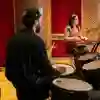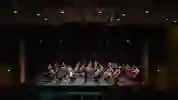


Gain the skills, knowledge and confidence to pursue a music career. Whether as a performer, radio broadcaster, songwriter, music technologist, or events organiser.
When you join Hull, you join a buzzing creative community. A tight-knit group of performers, composers, songwriters, producers, music psychologists, and writers.
You work on major creative projects – both on your own and with like-minded creatives. You use industry-standard recording studios and performance spaces. And you get the chance to gain work experience at local live events.
About this course
BA Music (Popular Music) is a variant of the BA Music programme. So you’ll share the same modules as other BA Music students. But when it comes to options within modules, you’ll focus on popular music.
To thrive in today’s popular music culture, you’ll need a mix of musical and technical skills. And to be able to work confidently with others across professional contexts. You'll study a range of technical skills to help you realise your best work. Project management, and rehearsal techniques. Music theory and lyric analysis. Fluency with key pieces of music software. Research skills, and social media skills for promoting your work. As well as festival programming.
You'll receive training in the critical and contextual dimensions of music. Working with expert staff to explore and challenge received wisdom about the value, status and significance of music in our society. Your practical work will culminate in a large-scale project: a stepping stone into your career.
And you can tap into our partnerships with the Royal Philharmonic Orchestra (RPO) and Opera North. RPO hold masterclasses and offer career advice. As well as ensemble coaching, one-to-one tuition, and work experience.
Life's not a rehearsal. But rehearsals are vital
Module options
Each year, you’ll study modules worth a certain number of credits, and you need 120 credits per year. Most modules are 20 credits – so you’ll study six modules each year. Some longer modules, such as a dissertation, are worth more. In these cases, you’ll study fewer modules - but the number of credits will always add up to 120. Some modules are compulsory, some are optional, so you can build a course that’s right for you.
Filters
Creating Recorded Music
Writer? Performer? Producer? Whatever your focus, you’ll work with fellow musicians to fully realise a musical recording. You’ll learn how to collaborate with others, each with different skills and roles, to create original music (including songwriting, instrumental works, electronic tracks and anything in-between) or to capture performance as a recorded artefact. You’ll finish the module with a portfolio-ready work.
core
20 credits
Creating Live Music
Channel your creativity into a live music event to develop your technical and artistic skills whatever your musical interests. You’ll collaborate with music and music production students to create a unique and original live music event, alongside developing core skills in project management, repertoire development and artistic presentation.
core
20 credits
Core Music Techniques
How does music work? How is it put together? Providing you with an essential proficiency in music theory and enabling you to realise your creative projects, you will develop your understanding of notation, harmony, melody, rhythm, alongside listening skills. You will form a portfolio for your final assessment from tasks across a variety of musical styles and techniques.
core
20 credits
Applied Music Skills
Get an in-depth understanding of how music is put together, along with how and why harmonic provides such a powerful force in music’s structure. Based on a range of musical styles, you’ll be given the tools and techniques to analyse structural and harmonic perspectives, and develop crucial listening skills for practical musicianship.
core
20 credits
Music, Criticism and Culture
Music can be profoundly significant for individuals in their daily lives, for politically-charged movements, and for entire cultures. This module will teach you different ways to ask such questions of music, and will help you to apply ideas derived from core literature to contemporary case studies.
core
20 credits
Music and its Histories
This introduces you to narratives that characterise histories of music across different historical periods, technologies, and styles. You will explore these while also pursuing specialist studies relevant to your degree pathway. Through a range of different music, you will look at their histories and the assumptions behind the construction of such histories.
core
20 credits
Individual Creative Project
What would you like to create? This module gives you the time, space, and expert support that you need to bring your individual project to life. You’ll be supported through planning, executing, and completion – which may be a performance, composition, recording, songwriting EP, educational practical project, or piece of sound design
core
20 credits
Collaborative Creative Project
Creative project management will explore the key methods used in a broad range of creative industries to organise and manage complex projects.
core
20 credits
Music and Its Objects
Explore how music has been shaped by the objects we associate with it: instruments, technologies, sound recordings, and notations. You will develop a critical approach to thinking about these, helping you to deepen your understanding of the historical context and critical significance of your own music-making activities.
core
20 credits
Our facilities





Watchlist
Dr Peter Elsdon
Course overview
1 min
The Future of Music
Course Highlight
7 mins
Humber Street Sesh
Course Highlight
2 mins
Featured academics
From DJs to band members, stage performers to session musicians, our performance-led staff are active in making music themselves. And they bring their passion and experience into everything you learn.
So you can be sure you’re getting a great education.

Dr Rowan Oliver
Senior Lecturer
Before joining the University of Hull, Rowan spent several years touring the world as the drummer in Goldfrapp (among various other musical exploits). He continues to record and perform internationally as a session musician.

Dr Mark Slater
Lecturer
Mark is a composer, producer and musicologist with an interest in the processes of how music is made, usually including uses of technology and improvisation in some way. His work is fuelled by an exploration of spontaneity and collaboration.
Entry Requirements
What do I need?
When it comes to applying to university, you'll need a certain number of UCAS points. Different qualifications and grades are worth a different amount of points. For this course, you'll need 112 UCAS points.
At least 80 points must come from A levels, BTEC, or other equivalent qualifications.
We consider experience and qualifications from the UK and worldwide which may not exactly match the combinations above.
But it's not just about the grades - we'll look at your whole application. We want to know what makes you tick, and about your previous experience, so make sure that you complete your personal statement.
Typical offer
112 UCAS points
A levels
BBC
BTEC
DMM
Fees & Funding
How much is it?
For UK students, our standard course fee is £9,535 per year. Keep in mind that some courses are longer - for example, spending your third year abroad will make your degree four years in total.
If you choose to study a foundation year as part of your course, the fee is £9,535.
How do I pay for it?
You can take out a tuition fee loan to cover the full cost of your course. Once you’ve successfully applied for this, you don’t need to do anything else – the money is sent straight to us.
You can also take out a maintenance loan of up to £10,544 a year to cover your living costs, depending on your household income.
Remember, you won’t start paying your loans back until you’ve left university and earn more than £25,000 per year.
See our full fees and funding information for more details and to find out what support we can offer.
Standard Tuition Fee
£9,535 / year
The amount you pay may increase each year, in line with inflation - but capped to the Retail Price Index.

Future prospects
You’ll graduate with essential skills for the music industry, plus, a professional portfolio of material for your CV. You’ll learn how to communicate confidently, both through your craft and face-to-face. You’ll also have access to our network of professional partners, providing opportunities for live projects, work experience, masterclasses, and more.
Some students set up record labels before they graduated. Others carve out their own careers in the industry. Our graduates go on to become musicians, composers, and recording artists. They also pursue careers as radio producers, music promoters, and events managers, as well as music therapists, teachers and journalists.
Become part of the next generation of futuremakers
Like what you've seen? Then it's time to apply.
The standard way is to apply through UCAS. This will give you the chance to showcase your skills qualities and passion for the subject, as well as providing us with your academic qualifications.
Not ready to apply yet?
Visit our next Open Day, and see all that Hull has to offer for yourself. Talk to our lecturers about your subject, find out what university is really like from our current students, and take a tour of our beautiful campus and amazing facilities.
You may also be interested in...
100% employability (Music) UK domicile full-time first degree leavers; Higher Education Graduate Outcomes statistics, for the academic year 2022/23, published by the Higher Education Statistics Agency June 2025.
All modules presented on this course page are subject to availability and this list may change at any time.